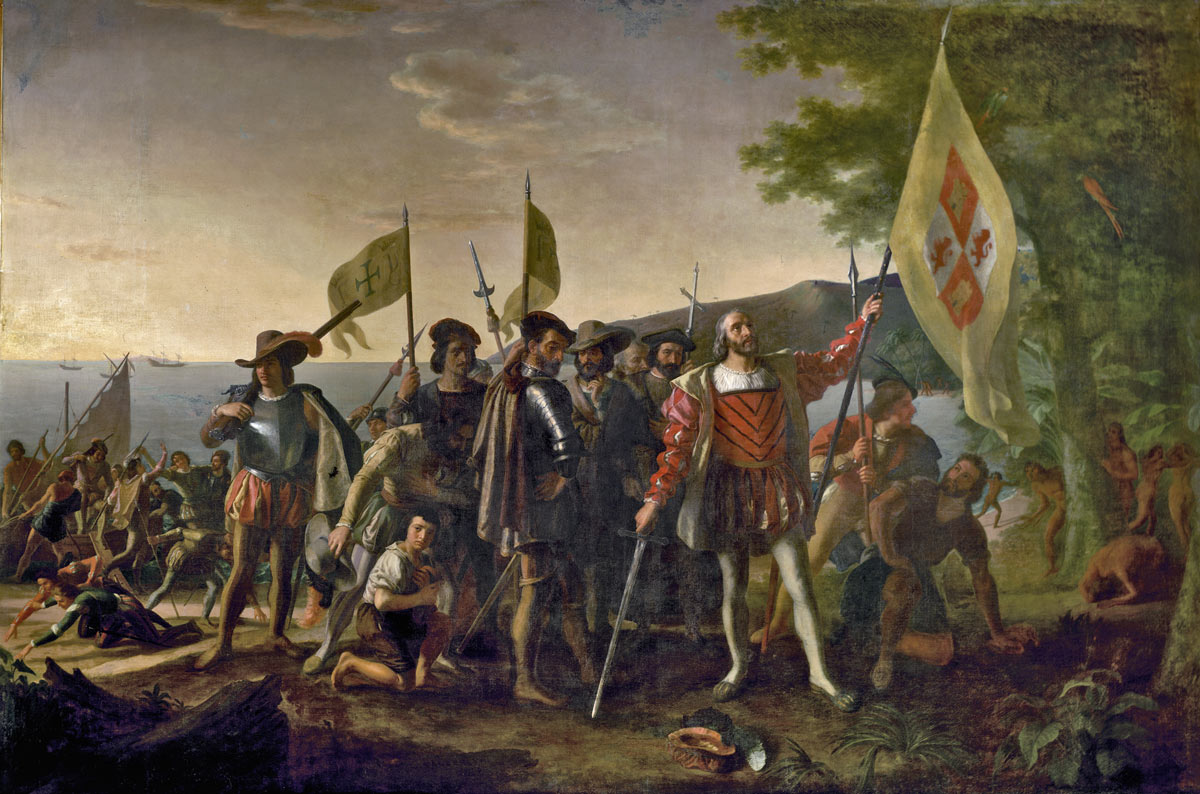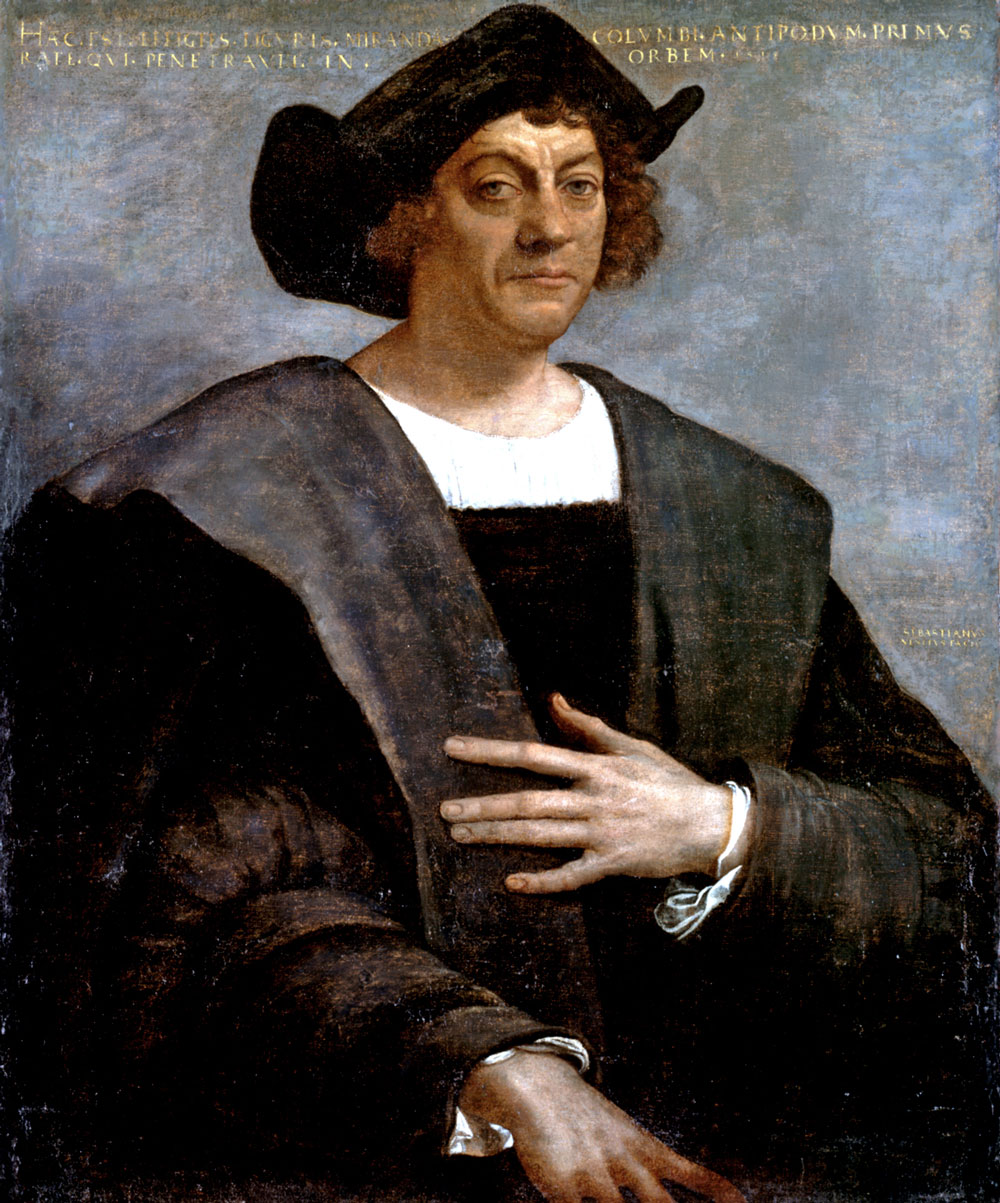The verdict of history
Christopher Columbus
Born c.1451, Genoa, Italy | Died 1506, Valladolid, Spain
Navigator & Explorer, Spain's Admiral of the Ocean Sea, Viceroy and Governor of the Indies, Discoverer of America
By the Divine will, I have placed under the sovereignty of the king and queen an ‘other world,’ whereby Spain, which was considered poor, is to become the richest of all countries.
Christopher Columbus
We don't know that much for sure about Christopher Columbus. The portrait above is supposedly him, and is often used as the basis for any physical descriptions, but Columbus it is not for it was painted over 10 years after his death: it may never have been intended to be. No one painted him in his lifetime.
On 15 March 1493 Columbus sailed back into the harbour of Palos de la Frontera in Andalusia bearing a handful of Native American captives and reports of success beyond his or anyone’s wildest dreams. When he returned to the New World later that year he did so as Viceroy and Governor of all those lands that lay in waiting, with over 1,000 men in his fleet ready to settle that New Spain on the far side of a world he had promised their Spanish majesties and delivered. From such heights, maybe the only way to go was down.
Arriving back in Hispaniola in November 1493 Columbus found the fort he had left there, La Navidad, in ruins, along with the bodies of 11 of its 39 settlers. Whatever dreams the aspiring colonists had brought from Spain, the realities of the New World were harsher than advertised, and many were angry at what they believed to be lies on Columbus’s part (until the first major gold strike, in Haiti in 1499). His further voyages took an immense toll on him physically, as he endured accusations of tyranny and incompetence as Governor, so much so that he was stripped of his rank by the King and thrown into prison. Sent back to Cadiz in chains, he lamented that while he had ‘placed under their sovereignty more land than there is in Africa and Europe, and more than 1,700 islands... now at the end of my days [I] have been despoiled of my honour and my property without cause, wherein is neither justice nor mercy.’
Though released Columbus never regained his rank, and on his fourth and final voyage to the ‘Indies’ he spent a year shipwrecked on Jamaica while the Spanish governor of Hispaniola took great satisfaction in ignoring his plight and leaving him to rot. On 20 May 1506 Columbus died in Valladolid, Spain, still in dispute with the Spanish crown over his rights to profits from the colonies, and with his reputation in tatters.
America, when it was so named a year after his death, was named after someone else.
England's imperial historians passed Columbus by in favour of a (slightly) more suitable exploratory posterboy, the Italian navigator Giovanni Caboto, who sailed from Bristol to Newfoundland (on the North American continent proper) in 1497 at the behest of Henry VII of England – English history often refers to him more colloquially as John Cabot. Columbus’s role in opening up the Americas drifted slowly into insignificance, and within a century or two of the first English settlements in the New World, few New England colonists much knew of or cared at all for the name Christopher Colombus.

All that had changed by 1792. The colonies, now states, had fought for and won their independence, and in throwing off British rule they threw away too their British identity. British heroes were out, American heroes were in, and the first of them was none other than Columbus, a figure of fearless ingenuity, a pioneer who defied the conventions of his time to sail west into the unknown, the very model of what it meant to be an American. There was serious talk of renaming America Columbia, and the federal capital, the District of Columbia bore his name as well as two state capitals (Ohio’s and South Carolina’s) and the Columbia River. In the nineteenth century he came close to being canonized by the Catholic Church, and writer, historian and diplomat Washington Irving all but did the job anyway in his wildly-popular and even more wildly-fanciful 1828 biography History of the Life and Voyages of Christopher Columbus. 1892 saw the 400th anniversary of his landing marked by celebrations and monuments throughout the United States (and Latin America) and, in 1893, the Columbian Exposition in Chicago, otherwise known as the Chicago World’s Fair. 12 October remains, throughout the Americas (except Canada), Columbus Day.
500 years on and celebrations were more muted: Europe’s empires had ended, and history belonged to other peoples too, other perspectives. No one can say how many natives died in the aftermath of, as a result of, Columbus’s arrival. 80–90% is a conservative estimate, but of how many millions? By slaughter, slavery or catastrophic epidemics such as smallpox, the indigenous populations were massacred, empires toppled, whole peoples wiped out. ‘Never again’ the world said after the Nazi genocide in 1945, and that was the result of the European colonization of the New World: genocide. Columbus's own role in this, in the enslavement and mutilation of Arawaks, the kidnap and sexual enslavement of women and girls, and his increasingly messianic delusions of personal glory all began to taint his image in posterity as much as it did his reputation among his contemporaries.
Sadly, in recent years,
President Trump declared gravely on Columbus Day 2020, radical activists have sought to undermine Christopher Columbus's legacy. These extremists seek to replace discussion of his vast contribution with talk of failings, his discoveries with atrocities and his achievements with transgressions.
For many Columbus remains the founder of their America, more so than Leif Erikson, certainly more so than the nameless millions already living there when he arrived. Despite never setting foot in North America, this man, this myth marked the genesis of white, Christian America. Like many 'great' men, his life and his deeds have been magnified by supporters and detractors alike, readily cast as hero or villain as the script requires, but rarely treated as anything so mundane or believable as a man.
When Columbus set sail from Palos on 3 August 1492 he did so not to depopulate a hemisphere, but to find a new sailing route to the Far East. This does not render him blameless, but blame serves no purpose. Howard Zinn wrote that 'what Columbus did to the Arawaks of the Bahamas, Cortés did to the Aztecs of Mexico, Pizarro to the Incas of Peru, and the English settlers of Virginia and Massuchusetts to the Powhatans and the Pequots.' Were any of these men especially evil? Were all of them? They saw the native peoples they encountered as less than human, Godless and savage, and acted accordingly, and the vast majority of their contemporaries thought the same. What makes their actions seem so terrible is less that they did what they did, for it is unlikely that they would have done anything else, but that they were so successful, that the contest was so one-sided.
Christopher Columbus not only opened the door to a new world, but also set an example for us all by showing what monumental feats can be accomplished through perseverance and faith.
George H. W. Bush
Why this was so is persuasively argued in Jared Diamond’s Guns, Germs and Steel (Vintage, 1997), which outlines the (predominately environmental) reasons why human civilisation in the Eurasian and American continents developed at, technologically speaking, such radically different rates, how animal domestication, intensive agriculture and urbanisation in Eurasia catalysed enormous growth in population and production and supported the emergence of religious, political and scientific specialists and elites. How growing cities crammed full of people and animals alike, and lacking even basic sanitation, conceived ever more virulent and deadly diseases, pathogens to which Eurasians developed resistance only at the cost of millions of deaths of their own. How centuries of religious and national wars had honed these unrivalled military machines and sent them forth looking for new worlds to conquer. And, ultimately, how 168 Spaniards could defeat an army of 80,000 Incas at Cajamarca, Peru, in 1532, capturing their emperor and with him their empire.
The native Americans could not engineer the temperatures necessary to work steel. They had never seen guns. They had never even seen horses, and had no defence against an armed and armoured cavalry charge. And they never saw the germs that wiped them out even faster than their European conquerors could slaughter them or they could kill themselves. Had the roles been reversed, and an Arawak ship beached on the shores of Spain in 1492 to the amazement of uncomprehending Spanish onlookers, would the end result have been so very different?
Christopher Columbus was a sailor. He was born in Genoa, Italy, most likely in 1451, to a family of wool merchants. He apprenticed under some of the prominent Genoese trading families, and sailed on commercial voyages across Europe and West Africa. He was an avid reader and a largely self-taught cartographer, and in 1485 he envisaged his great scheme, to reach the Far East by sailing west, a dream he clung to for seven years before the Spanish Queen finally enabled him to realise it.
The portrait above probably isn’t him – the label was added later.
I saw this cape so green and so beautiful, like all the other lands of these islands, I scarcely knew which to visit first; for I can never tire my eyes in looking at such lovely vegetation, so different from ours. I believe that there are many herbs and many trees that are worth much in Europe for dyes and medicines; but I do not know, and this causes me great sorrow. Arriving at this cape, I found the smell of the trees and flowers so delicious that it seemed the pleasantest thing in the world.
Christopher Columbus
Bibliography
- Brogan, H. (2001) The Penguin History of the United States of America (2nd ed.), London, Penguin.
- Diamond, J. (1998) Guns, Germs and Steel: A short history of everybody for the last 13,000 years, London, Vintage.
- English, O. (2021) Fake History: Ten Great Lies and How They Shaped the World, London, Welbeck.

